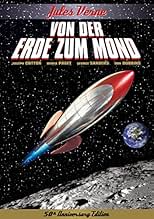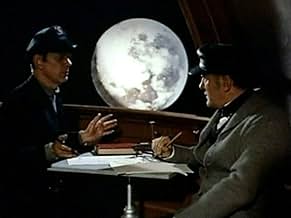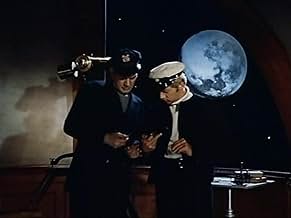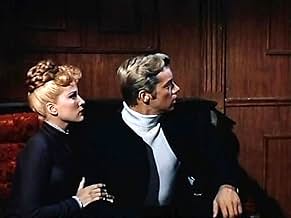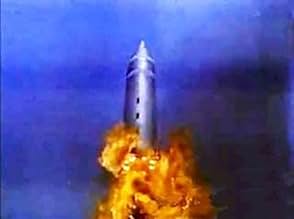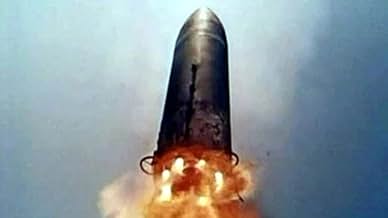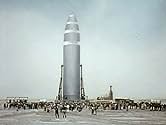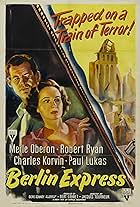IMDb RATING
5.1/10
1.9K
YOUR RATING
In 1868, American inventor Victor Barbicane develops a powerful military explosive that he also uses as fuel for a moon-bound rocket manned by himself and a motley crew.In 1868, American inventor Victor Barbicane develops a powerful military explosive that he also uses as fuel for a moon-bound rocket manned by himself and a motley crew.In 1868, American inventor Victor Barbicane develops a powerful military explosive that he also uses as fuel for a moon-bound rocket manned by himself and a motley crew.
- Director
- Writers
- Stars
Ludwig Stössel
- Aldo Von Metz
- (as Ludwig Stossel)
Morris Ankrum
- US President
- (uncredited)
Robert Clarke
- Narrator
- (voice)
- (uncredited)
Les Tremayne
- Countdown Announcer
- (uncredited)
- Director
- Writers
- All cast & crew
- Production, box office & more at IMDbPro
Featured reviews
A scientist (Joseph Cotton) and a millionaire arms dealer (George Sanders) team up on the construction of a rocket to blast themselves to the Moon. This movie was based on a Jules Verne classic -- but it completely lacks the charm and the quality of `Journey to the Center of the Earth' and `20,000 Leagues Under the Sea'.
Even though the cast includes Morris Ankrum (the Grand Old Man of vintage sci-fi) to provide dignity, and Debra Paget to provide scenery (watch `Princess of the Nile' and go quietly insane), it wasn't enough to save this numbingly slow and unappealing film.
Some of the special effects are astoundingly bad, considering the fair production standards. In the scenes of the blast-off, the supporting bar which holds up the rocket model is clearly visible! Fans of `Forbidden Planet' will notice the heavy use of the `electronic tonalities' borrowed from that classic. Directed by Byron Haskins, who did both `War of the Worlds' and `The Conquest of Space'.
Even though the cast includes Morris Ankrum (the Grand Old Man of vintage sci-fi) to provide dignity, and Debra Paget to provide scenery (watch `Princess of the Nile' and go quietly insane), it wasn't enough to save this numbingly slow and unappealing film.
Some of the special effects are astoundingly bad, considering the fair production standards. In the scenes of the blast-off, the supporting bar which holds up the rocket model is clearly visible! Fans of `Forbidden Planet' will notice the heavy use of the `electronic tonalities' borrowed from that classic. Directed by Byron Haskins, who did both `War of the Worlds' and `The Conquest of Space'.
This 1959 movie adaptation of Jules Verne's "From the Earth to the Moon" is the graveyard of declining actors. Joseph Cotton and George Sanders were at the end of fairly successful film careers and about to be relegated to guest appearances on a variety of television shows; the most notable being Sander's Mr. Freeze on "Batman". Debra Paget was in her late twenties; she had lost her glow and was used up by Hollywood standards. The change to an unflattering "strawberry" blonde look exacerbated the problem as few actresses have ever been less suited to a light hair color.
On the plus side, the movie itself is a fairly accurate adaptation of Verne's story; at least the book's illustrations appear to have been used as models for the rocket and the cannon. Verne's 19th century take on space travel turned out to be more accurate than most of the speculation during the first half of the 20th century.
The adaptation's biggest problem was altering Verne's story by inserting a topical theme about the post WWII arms race. In Verne's 1865 novel, the Baltimore Gun Club itself set about building a rocket to go to the Moon. In the adaptation a munitions manufacturer (think "Destination Moon") concocts the scheme to demonstrate his powerful new explosive. With a lot of discussion about science, weapons, and peace the movie dances around the subject extensively yet never makes a coherent point about its position (regarding the nuclear arms race), as if simply inserting the theme is somehow sufficient.
The movie is a cross between "Destination Moon" and "Rocketship X-M", combining the former's good science and bad political message with the latter's dismal sets and comical special effects. The acting in all three films is equally sad.
The premise has munitions manufacturer Victor Barbicane (Cotton) discovering an explosive (Power X) capable of firing a shell-like projectile to the moon. His plan is opposed for philosophical/religious reasons by Stuyvesant Nicholl (Sanders), another manufacturer. Although these philosophical differences play an important part in the story, they are never convincingly elaborated on, which undermines the basic storyline.
President Grant orders Barbicane to abandon the project because it is considered an act of war by other nations. While this is unconvincing it does serve as Barbicane's inspiration to change the project to a manned space flight. Nicholl then agrees to manufacture the ceramic coating needed for re-entry and to accompany Barbicane on a flight to the moon. Paget plays Nicholl's daughter who hides inside the rocket just prior to take-off.
"From the Earth to the Moon" is often confused with "First Men in the Moon" which was made five years later. Probably because both are set in the 19th century and both feature a female stowaway (played by Martha Hyer in the later film). "First Men in the Moon" (while not a great film) is superior in virtually every detail to "From the Earth to the Moon". Rather ironically it was adapted from a story by "H.G. Wells", an early science fiction writer often compared to Verne.
Movie adaptations of Verne's books were a big thing in the 1950's and early 1960's. Among the good ones were "20,000 Leagues Under the Sea" (1954), "Around the World in 80 Days" (1956), "Journey to the Center of the Earth"(1959), "Mysterious Island" (1961), and "Master of the World" (1961). Unfortunately "From the Earth to the Moon" is simply not in the same league as these examples.
Then again, what do I know? I'm only a child.
On the plus side, the movie itself is a fairly accurate adaptation of Verne's story; at least the book's illustrations appear to have been used as models for the rocket and the cannon. Verne's 19th century take on space travel turned out to be more accurate than most of the speculation during the first half of the 20th century.
The adaptation's biggest problem was altering Verne's story by inserting a topical theme about the post WWII arms race. In Verne's 1865 novel, the Baltimore Gun Club itself set about building a rocket to go to the Moon. In the adaptation a munitions manufacturer (think "Destination Moon") concocts the scheme to demonstrate his powerful new explosive. With a lot of discussion about science, weapons, and peace the movie dances around the subject extensively yet never makes a coherent point about its position (regarding the nuclear arms race), as if simply inserting the theme is somehow sufficient.
The movie is a cross between "Destination Moon" and "Rocketship X-M", combining the former's good science and bad political message with the latter's dismal sets and comical special effects. The acting in all three films is equally sad.
The premise has munitions manufacturer Victor Barbicane (Cotton) discovering an explosive (Power X) capable of firing a shell-like projectile to the moon. His plan is opposed for philosophical/religious reasons by Stuyvesant Nicholl (Sanders), another manufacturer. Although these philosophical differences play an important part in the story, they are never convincingly elaborated on, which undermines the basic storyline.
President Grant orders Barbicane to abandon the project because it is considered an act of war by other nations. While this is unconvincing it does serve as Barbicane's inspiration to change the project to a manned space flight. Nicholl then agrees to manufacture the ceramic coating needed for re-entry and to accompany Barbicane on a flight to the moon. Paget plays Nicholl's daughter who hides inside the rocket just prior to take-off.
"From the Earth to the Moon" is often confused with "First Men in the Moon" which was made five years later. Probably because both are set in the 19th century and both feature a female stowaway (played by Martha Hyer in the later film). "First Men in the Moon" (while not a great film) is superior in virtually every detail to "From the Earth to the Moon". Rather ironically it was adapted from a story by "H.G. Wells", an early science fiction writer often compared to Verne.
Movie adaptations of Verne's books were a big thing in the 1950's and early 1960's. Among the good ones were "20,000 Leagues Under the Sea" (1954), "Around the World in 80 Days" (1956), "Journey to the Center of the Earth"(1959), "Mysterious Island" (1961), and "Master of the World" (1961). Unfortunately "From the Earth to the Moon" is simply not in the same league as these examples.
Then again, what do I know? I'm only a child.
After TWENTY THOUSAND LEAGUES UNDER THE SEA and AROUND THE WORLD IN EIGHTY DAYS it is most likely that the most popular of Jules Verne's titles (the ones that most people are familiar with) is his 1865 novel FROM THE EARTH TO THE MOON, together with it's first sequel, the 1870 novel AROUND THE MOON. What fascinates everyone is that for all the errors we now know of Verne's huge cannon idea (it would crush and vaporize the space travelers before they left the cannon's mouth) he was on target on so many points. He felt the Americans would do it first (we did - though barely); It would be sent from Florida (near where Cape Kennedy is located, by the way); Texas would be important in the project (in the novel Texas wants the honor of being the site of the cannon, but in reality Nasa's central space tracking center is in Houston); The capsule would be bullet shaped (not quite correct, but look at the rockets we used); The capsule would return to the earth and land in the Atlantic, to be recovered by an American battleship. Nice guesswork (or homework) Jules! To be fair to Verne, even his cannon idea was not a bad one - it was more plausible than Cyrano de Bergerac's bottles of morning dew (which his poetic fancy said would lift the traveler) or Poe's free flying balloon in HANS PFALL. But what is not noticed by most readers (due to translations) is Verne's social and political satire. He liked Americans, but he recognized our bellicosity, self-image building (we always did it better than anyone else) and our economic and political expansionism. Verne, like many Frenchmen, supported Lincoln and the North in the Civil War, especially after the Emancipation Proclamation. In 1887 he wrote a two volume novel NORTH AND SOUTH, in which the Confederates are the villains. But he saw American enterprise as haphazard and not well planned. He was very critical of it in THE FLOATING ISLAND, where greed by American millionaires destroys a remarkable artificial island. Even in his first published novel, FIVE WEEKS IN A BALLOON, at a philosophical moment one of the characters says that if the world ever is destroyed an American will have a hand in it.
So in the novel, the Baltimore Gun Club members are all leading engineers who helped the Northern cause by building better guns and cannon. Most of them are missing limbs as a result. The President of the club, J.P. Barbicane (in some versions his name is "Impey" Barbicane) has his limbs. His closest associate, the club's secretary, J.T. Maston, has most of his body, but has one hook for a hand. They are the only members with "in tact" bodies. The club is seeking something to do with it's time, after the Confederacy collapses. Barbicane suggests building the "Columbiad" (which, by the way, is the cannon, not the projectile) to travel or communicate with the moon. The plan is barely presented when Maston suggests using the cannon instead to annex Mexico! See - Verne has our bellicosity down quite pat.
Barbicane has a wartime rival, one Captain Nicholl. Nicholl specialized in better and better armor. Barbicane specialized in better and better shells to pierce the armor. Nicholl will soon become the leading critic of the scheme.
Verne (in real life) was a friend of the prominent aeronaut and photographer, Nadar. Nadar became the model for the French adventurer Michel Ardan (note the anagram last name for "Nadar") who proposes traveling in the projectile to the moon. Barbicane and Nicholl end up joining him (while Maston will be in charge of carefully following their travel by powerful telescope). The flight actually had great accuracy in detailing the length of the trip (four days) and in showing the amazing effect of weightlessness (Verne noted that by leaving the gravity field of earth this would result). The capsule never lands on the moon (it couldn't, because if it had it would not have been capable of getting back. Verne explains that there is a miscalculation in the calculations of the trajectory. This enables the moon to help send the capsule back to earth.
Nadar/Ardan is not in the movie. Nicholl does not become so completely involved and willing to work with Barbicane as the novel shows. George Sanders' Stuyvesant Nicholl ("Stuyvesant"?) remains hostile to Joseph Cotton's Victor Barbicane (what happened to "Impey") up to a few minutes before the conclusion. There is no power X in the novel - no new energy source. The movie was made in the 1950s, so the public had to think that Verne was thinking in terms of atomic power. Actually he never did. There is no romance between the children of Sanders and Cotton. These changes in the film help weaken the film in comparison to the novel (which still reads well - try to get the translation by Walter Miller that is the best in English).
This was not the only film version of the novel. The classic early film by George Melies, A TRIP TO THE MOON, has a period charm that makes one forget it's cardboard backgrounds (and it's projectile in the eye of the man in the moon is a classic moment of cinema). And then there was the film ROCKET TO THE MOON which turned the story into an all-star comedy with Burl Ives, Terry-Thomas, Lionel Jeffries, and Dennis Price.
Verne was not finished with his travelers either, after AROUND THE MOON. In 1889 he wrote THE PURCHASE OF THE NORTH POLE, where the Gun Club decides to use the Columbiad to alter the tilt of the globe. Ardan does not reappear, but Barbicane, Nicholl, and Marston do. It is not as good a novel as the first two.
So in the novel, the Baltimore Gun Club members are all leading engineers who helped the Northern cause by building better guns and cannon. Most of them are missing limbs as a result. The President of the club, J.P. Barbicane (in some versions his name is "Impey" Barbicane) has his limbs. His closest associate, the club's secretary, J.T. Maston, has most of his body, but has one hook for a hand. They are the only members with "in tact" bodies. The club is seeking something to do with it's time, after the Confederacy collapses. Barbicane suggests building the "Columbiad" (which, by the way, is the cannon, not the projectile) to travel or communicate with the moon. The plan is barely presented when Maston suggests using the cannon instead to annex Mexico! See - Verne has our bellicosity down quite pat.
Barbicane has a wartime rival, one Captain Nicholl. Nicholl specialized in better and better armor. Barbicane specialized in better and better shells to pierce the armor. Nicholl will soon become the leading critic of the scheme.
Verne (in real life) was a friend of the prominent aeronaut and photographer, Nadar. Nadar became the model for the French adventurer Michel Ardan (note the anagram last name for "Nadar") who proposes traveling in the projectile to the moon. Barbicane and Nicholl end up joining him (while Maston will be in charge of carefully following their travel by powerful telescope). The flight actually had great accuracy in detailing the length of the trip (four days) and in showing the amazing effect of weightlessness (Verne noted that by leaving the gravity field of earth this would result). The capsule never lands on the moon (it couldn't, because if it had it would not have been capable of getting back. Verne explains that there is a miscalculation in the calculations of the trajectory. This enables the moon to help send the capsule back to earth.
Nadar/Ardan is not in the movie. Nicholl does not become so completely involved and willing to work with Barbicane as the novel shows. George Sanders' Stuyvesant Nicholl ("Stuyvesant"?) remains hostile to Joseph Cotton's Victor Barbicane (what happened to "Impey") up to a few minutes before the conclusion. There is no power X in the novel - no new energy source. The movie was made in the 1950s, so the public had to think that Verne was thinking in terms of atomic power. Actually he never did. There is no romance between the children of Sanders and Cotton. These changes in the film help weaken the film in comparison to the novel (which still reads well - try to get the translation by Walter Miller that is the best in English).
This was not the only film version of the novel. The classic early film by George Melies, A TRIP TO THE MOON, has a period charm that makes one forget it's cardboard backgrounds (and it's projectile in the eye of the man in the moon is a classic moment of cinema). And then there was the film ROCKET TO THE MOON which turned the story into an all-star comedy with Burl Ives, Terry-Thomas, Lionel Jeffries, and Dennis Price.
Verne was not finished with his travelers either, after AROUND THE MOON. In 1889 he wrote THE PURCHASE OF THE NORTH POLE, where the Gun Club decides to use the Columbiad to alter the tilt of the globe. Ardan does not reappear, but Barbicane, Nicholl, and Marston do. It is not as good a novel as the first two.
Byron Haskin was a science fiction specialist, for the big screen and also the TV industry: OUTER LIMITS, the best known and most terrific sci-fi series ever made, the most daring, brilliant, and which Byron Haskin was a lead director, with Gerd Oswald too. So it was not a surprise to enjoy this historical and fiction, Jules Verne's adaptation, movie. Joseph Cotten is wonderful in this enjoyable film, very entertaining, where tension grows all long the movie. You can be a bit bored by long talks, but don't be bothered by this. This is a great film from this director, maybe not his best, I agree, but he was the perfect choice as a director for such a topic. Of course I prefer NAKED JUNGLE or WAR OF THE WORLDS....
I feel tvholic's views are a bit harsh. It mustn't be forgotten that Verne wrote this in 1865 some thirty years before Wells wrote 'War of the Worlds". It must also be remembered that RKO was going broke at the time so special effects were not what they should have been. Stars Joseph Cotten and George Sanders did well with the script they had. Where this will not go down as a great sci fi movie, it is still an interesting one if for no other reason than the interplay between Cotten and Sanders.
Stories like War of the Worlds, 20,000 Leagues Under The Sea and Around the World in 80 Days have lent themselves to the use of special effects and unfortunately for this film, the film production company did not have the wherewithal to have effects in the same class as the aforementioned three.
Stories like War of the Worlds, 20,000 Leagues Under The Sea and Around the World in 80 Days have lent themselves to the use of special effects and unfortunately for this film, the film production company did not have the wherewithal to have effects in the same class as the aforementioned three.
Storyline
Did you know
- TriviaSome of the music is actually the "electronic tonalities" created by Louis Barron and Bebe Barron for Forbidden Planet (1956).
- GoofsDespite dire warnings of death should occupants of the projectile NOT be in the "acceleration tubes" upon launch, no explanation is offered as to why Virginia isn't turned to goo by stowing away in another room.
- Crazy creditsOpening credits are on the pages of a book, with the leads' photos included above the name.
- ConnectionsReferenced in Trumbo (2007)
- SoundtracksElectronic Tonalities
(uncredited)
from Forbidden Planet (1956)
composed by Bebe Barron and Louis Barron
heard during the scenes on board the rocket
- How long is From the Earth to the Moon?Powered by Alexa
Details
- Release date
- Country of origin
- Language
- Also known as
- Von der Erde zum Mond
- Filming locations
- Production companies
- See more company credits at IMDbPro
- Runtime1 hour 41 minutes
- Aspect ratio
- 1.85 : 1
Contribute to this page
Suggest an edit or add missing content

Top Gap
By what name was From the Earth to the Moon (1958) officially released in India in English?
Answer

